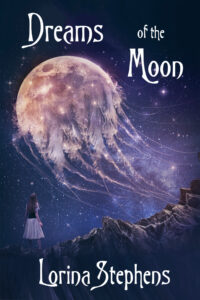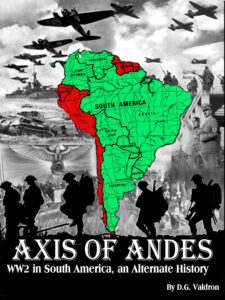Blog Tour with D.G. Valdron
The blog tour continues

I am very pleased to have been a guest author at Den Valdron’s website recently, where I talked about my latest collection of short stories, Dreams of the Moon, and in particular about the genesis of the second story in the collection, At Union, which first appeared in Postscripts to Darkness.
I’d also like you to:
Meet D.G. Valdron
… who is a remarkable writer. I was very pleased to have published his first novel, The Mermaid’s Tale, which I still believe is one the most profound works of fantasy in the past 20 years. Alas, I did have to return all rights to authors last year when I had to do a restructuring of Five Rivers Publishing because of elder care.

Den is a prodigious and prolific author. I’m pleased to feature him here where he talks about his latest work, an alternative history, Axis of Andes.

“Berlin, 1937, Adolph Hitler and his cabinet meet with a delegation from the tiny Latin American nation of Ecuador, seeking Germany’s help in deterring an invasion by their aggressive, larger neighbour Peru. The results of that fateful meeting set in motion a chain of events that will set the continent on fire, involving almost every country in South America a third theatre of World War II.” Axis of Andes, the Chronicle of the Andean wars.
Except that it never happened. But it might have. Welcome to Alternate History, emphasis on history.
You’ve probably heard of it, or at least seen it around. There are a lot of books and movies that start with the premise that the Confederacy wins the civil war, Harry Turtledove writes a lot of them. Or that explore Hitler winning World War II. We’ve all heard of The Man in the High Castle. Honestly, those subjects have been done to death.
But there’s more to Alternate History than that. History is not the careful linear progression we think it is, it is not a straight line pointing ever upwards. History is chaotic, anarchic, it’s full of left turns and unexpected developments. The past is littered with entire civilizations on their way to a glorious future when a car jumped the curb and they never saw it coming.
It could have gone the other way, something else could have happened, and everything would have been completely different.
Let me give you a tiny example. Gunpowder. There’s nothing inevitable about the components that make up gunpowder, there’s no reason to put them together at all. Gunpowder was an accident. It was created by a Chinese apothecary who was mixing different substances together to create a formula for immortality. Boy, did he get it wrong.
But it was a fluke. If that apothecary had settled on a different mixture, no gunpowder. No gunpowder, no fireworks, no explosives, no cannon, no rifles, no pistols. Without cannons, all those medieval European fortresses don’t become obsolete. Safe in their castles, Lords don’t have to bow to kings. European states don’t arise. Colonialism doesn’t happen. Machine guns aren’t invented, no world wars, we miss the bloody trench war of 1914. Everything changes.
Or, how about this – one tiny molecule shifts on a virus that lets it jump from bat to human. One guy infected with that virus who heels like hell, but instead of staying home and sleeping it off, he goes to the market and spreads it around… And here we are in the Coronaclypse.
Which brings me back to the Axis of Andes, and the chronicles of the Andean Wars. In our history, Latin America is a bit of a backwater. A collection of sleepy little countries, occasionally having petty wars and pettier dictatorships, a source of coffee and chocolate, but mostly, a place where nothing much happens that the rest of the world cares about. These are lands with vivid histories, full of tragedy and comedy, human aspiration and failure, so often overlooked.
Latin America was lucky to have largely avoided the horrors of both World Wars, and the transformations that came with them. But what if they hadn’t been lucky? What if one little thing, just one little thing had changed. And what if that one little change had rippled through, slowly gathering strength like a snowball rolling down the hill, setting other snowballs rolling, becoming an avalanche as it goes until everything is different and it’s all chaos and thunder.
What if Ecuador has a stable government that sees the war coming and does its best to put up a real fight. What if Ecuador, desperate to avoid an invasion tries to make alliances in Europe and Latin America, and these efforts change the politics of nations, leading to governments more bellicose or unstable, what if the relationships between these nations changes. The war that everyone struggles to avoid becomes inevitable, the dominos fall one by one, and everyone is drawn in..
Welcome to good people sensibly making bad decisions, and ordinary people muddling through as best they can. Welcome to tragedy as everyone sees their plans going hopelessly off the rails, and the absurdity that results.
Fair warning, this alternate history is a history. The Andean Wars aren’t a backdrop for some personal adventure. While there are narrative scenes of the characters as their lives play out, we take deep dives into the history of each nation, exploring their economies and societies, their schisms and their agendas. We see the real history of how each enters the depression, and see how each nation is transformed by accumulating events.
And within the framework of the Axis of the Andes, and the history of the Andean Wars, we explore the big questions, the nature of fascism, of racism, the triumphs of and ambitions, the paths that humans choose. In the end, it’s a breathtaking tale of folly as events proceed beyond everyone’s control.
I guarantee, you will have never read anything quite like it. If you want a slice of a world next door, a place where things turned out differently, check it out.
Axis of Andes and New World War, constitute two volume chronicle of the second world war as it might have come to South America. Available as an ebook on most platforms. And if you’re interested, check out my website and blog, for a journey into the quirky and strange, denvaldron.com.
Who is D.G. Valdron?
First off, I’m very private, and quite reclusive. I don’t like having my picture up. I’m not thrilled with revealing much of anything about my life. But apparently, as a writer, you have to put yourself out there. So here goes.
I’m a wayward Maritimer (that’s the term for a person from the Atlantic Canadian provinces of New Brunswick, Nova Scotia or Prince Edward Island), born on the north shore of New Brunswick, in a pulp and paper town called Dalhousie. Currently a denizen of the Canadian prairie.
My dad was a mechanic, my grandfather was a carpenter, and between the two of them, it left me an arsenal of skills, a work ethic, and a practical approach to life.
Dad worked two jobs actually. He was a papermaker at the mill, so was my grandfather, and so was my brother, so that was at least three generations of us. Dad had a tireless energy, on top of working at the mill, and being a mechanic with his own garage, we ran a car wash, a motel, a drive-in theatre, a lot of small businesses. Growing up, we did everything and worked on everything from retreading tires, to small manufacturing, to construction, to running cement, doing carpentry, and working on cars. We raised chickens. There was always something to do. We were all involved, the whole extended family.
The drive in was a big one though. I spent the summers of my youth working at a drive in theatre, which has left me with a lifelong appreciation for B-movies and pop culture. That and watching old carry-on movies, and older horror movies on Shock Theatre, late at nights when I was sleeping at the Garage, to keep it safe from break ins..
I was a little smarter than average, so that got me into University. It was a revelation, and I decided to spend the rest of my life there. I wanted to be a student forever, surrounded by books and ideas. I got into campus journalism, and began to experiment with being a writer, it was a heady time. I kept collecting degrees. But unfortunately that eventually wore thin so I decided to see what the rest of the world was like.
I’ve had the usual assortment of quirky writers jobs, mechanic, carpenter, projectionist, cook, waiter, woodcutter ditch-digger, journalist and school teacher. These days I’m a lawyer working in the field of aboriginal rights, I’ve been doing that for a while, I’m good at it, and I like to think I make a difference.
Let’s face it, anyone who wants a career in the arts needs to have a day job to pay the bills. And I’m trying to write a bit here and there.
I think I’ve been a writer my whole life, even when I wasn’t writing.